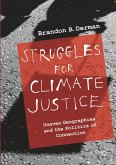This book pulls together major critiques of contemporary attempts to explain nature-society relations in an environmentally deterministic way. After defining key terms, it reviews the history of environmental determinism's rise and fall within geography in the early twentieth century. It discusses the key reasons for the doctrine's rejection and presents alternative, non-deterministic frameworks developed within geography for analyzing the roles played by the environment in human affairs. The authors examine the rise in recent decades of neo-deterministic approaches to such issues as the demarcation of regions, the causes of civilizational collapse in prehistory, today's globally uneven patterns of human well-being, and the consequences of human-induced climate change. In each case, the authors draw on the insights and approaches of geography, the academic discipline most conversant with the interactions of society and environment, to challenge the widespread acceptance that suchapproaches have won. The book will appeal to those working on human-environmental research, international development and global policy initiatives.
Bitte wählen Sie Ihr Anliegen aus.
Rechnungen
Retourenschein anfordern
Bestellstatus
Storno








